Thinking about venturing into the world of GCP but don’t know where to begin? Look no further! In this article, we’ll take you on a journey through the fundamentals of Google Cloud Platform (GCP). From understanding the basic concepts to exploring the key services, we’ve got you covered. Whether you’re a developer, IT professional, or simply curious about cloud computing, this beginner’s guide will equip you with the knowledge and confidence to embark on your GCP adventure. So, let’s jump right in and explore the exciting possibilities that await you in the realm of GCP!
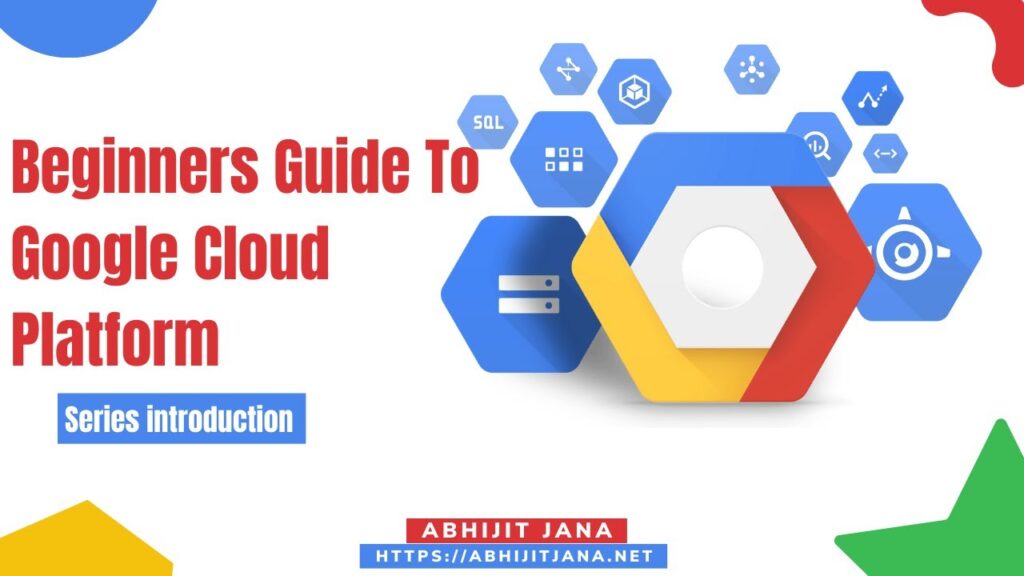
What is GCP?
GCP, or Google Cloud Platform, is a suite of cloud computing services provided by Google. It offers a wide range of infrastructure and platform services, allowing individuals and organizations to build and deploy applications, store and analyze data, and take advantage of machine learning and artificial intelligence capabilities. GCP provides a scalable and reliable infrastructure that is backed by Google’s extensive network and data centers, ensuring high availability and security for its users. Whether you are a small startup, a large enterprise, or an individual developer, GCP offers a flexible and cost-effective solution to meet your cloud computing needs.
Introduction to GCP
GCP is designed to provide a comprehensive set of tools and services that enable users to create and manage their applications and data in the cloud. With GCP, users can easily scale their applications to accommodate growing demands, reduce costs with pay-as-you-go pricing models, and ensure the reliability and security of their systems. GCP also includes a wide range of pre-built services and APIs that developers can leverage to quickly build and deploy their applications. Whether you need compute resources, storage solutions, database management, or advanced analytics capabilities, GCP has got you covered.
Overview of GCP services
GCP offers a wide range of services to cater to different needs and requirements. Some key services include:
-
Compute Engine: This service allows users to create and manage virtual machines (VMs) in the cloud. It provides customizable virtual machine instances with varying computing power, allowing users to choose the best fit for their applications.
-
App Engine: App Engine is a fully managed serverless platform that allows users to build and deploy web applications and APIs without the need to worry about infrastructure management. It auto-scales applications based on demand and provides built-in security and monitoring features.
-
Kubernetes Engine: Kubernetes Engine is a managed Kubernetes service that allows users to deploy, manage, and scale containerized applications. It provides a robust and scalable platform for container orchestration and simplifies the deployment and management of applications in a distributed environment.
-
Cloud Storage: Cloud Storage offers a scalable and secure object storage service for storing and retrieving data. It provides the flexibility to store and retrieve data from anywhere in the world and offers various storage classes to meet different performance and cost requirements.
-
BigQuery: BigQuery is Google’s fully-managed data warehouse and analytics platform. It allows users to analyze large datasets using SQL queries and provides high-speed data processing capabilities. BigQuery is suitable for both batch and real-time analytics and can handle petabytes of data.
-
Cloud Pub/Sub: Cloud Pub/Sub is a messaging service that allows applications to send and receive messages asynchronously. It provides reliable and scalable messaging capabilities and can be used for real-time analytics, event-driven architectures, and system integration.
-
Cloud Spanner: Cloud Spanner is a globally distributed relational database service that offers strong consistency and scalability. It provides ACID transactions, automatic scaling, and high availability, making it suitable for mission-critical applications that require a globally consistent and highly available database.
These are just a few examples of the services offered by GCP. The platform provides many more services and APIs that cater to various use cases and industries.
Benefits of GCP
GCP offers several benefits that make it a popular choice for businesses and developers. Here are some of the key benefits:
Scalability and Flexibility
One of the major advantages of GCP is its scalability and flexibility. With GCP, users can easily scale their applications up or down based on demand. Whether you need more computing power, storage capacity, or bandwidth, GCP allows you to allocate resources as needed and only pay for what you use. This flexibility enables businesses to quickly adapt to changing requirements and handle increased traffic or workload without hassle.
Cost-effectiveness
GCP offers a cost-effective solution for businesses and developers. With its pay-as-you-go pricing model, users only pay for the resources they consume. GCP provides transparent and competitive pricing, making it easier for organizations to manage their cloud costs. Additionally, GCP offers various cost optimization tools and strategies to help users minimize their cloud expenses, such as automatic resource management and usage analysis.
Reliability and Security
Google has a proven track record in providing reliable and secure services, and GCP is no exception. GCP ensures high availability and uptime through its global network and data centers located around the world. It also offers robust security features and compliance certifications, ensuring the protection and confidentiality of data. GCP implements advanced security measures, including encryption, access controls, and identity and access management, to prevent unauthorized access and protect against data breaches.
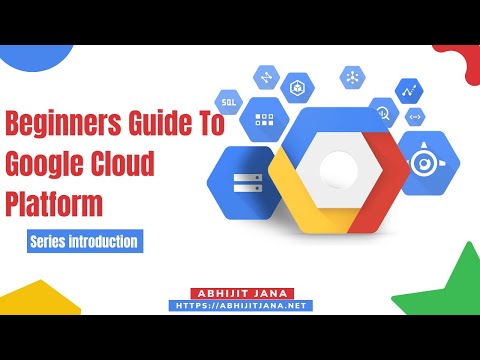
Key GCP Services
GCP offers a wide range of services that cater to various needs and use cases. Here are some key services offered by GCP:
Compute Engine
Compute Engine is a service that allows users to create and manage virtual machines in the cloud. It provides flexible and customizable virtual machine instances, allowing users to choose the desired computing power and resources for their applications. Compute Engine offers features like automatic scaling, load balancing, and live migration, ensuring high availability and reliability.
App Engine
App Engine is a fully managed serverless platform for building and deploying web applications and APIs. It allows users to focus on their application code without worrying about infrastructure management. App Engine auto-scales applications based on demand, ensuring optimal performance and cost-efficiency. It supports multiple programming languages and provides built-in security, monitoring, and logging features.
Kubernetes Engine
Kubernetes Engine is a managed Kubernetes service that simplifies the deployment and management of containerized applications. It provides a scalable and robust platform for container orchestration, allowing users to run applications in a distributed environment. Kubernetes Engine offers features like automatic scaling, load balancing, and rolling updates, ensuring high availability and seamless application deployment.
Cloud Storage
Cloud Storage is a scalable and secure object storage service for storing and retrieving data. It offers a highly available and durable storage solution with multiple storage classes to meet different performance and cost requirements. Cloud Storage allows users to store and access data from anywhere in the world and provides features like data encryption, access controls, and lifecycle management.
BigQuery
BigQuery is Google’s fully-managed data warehouse and analytics platform. It allows users to analyze large datasets using SQL queries and provides high-speed data processing capabilities. BigQuery supports both batch and real-time analytics and can handle petabytes of data. It offers features like automatic scaling, data encryption, and integration with other GCP services.
Cloud Pub/Sub
Cloud Pub/Sub is a messaging service that enables applications to send and receive messages asynchronously. It provides reliable and scalable messaging capabilities and can be used for building real-time analytics systems, event-driven architectures, and system integration. Cloud Pub/Sub offers features like message ordering, scaling, and filtering, ensuring the reliable delivery of messages.
Cloud Spanner
Cloud Spanner is a globally distributed relational database service that offers strong consistency and scalability. It provides ACID transactions, automatic scaling, and high availability, making it suitable for mission-critical applications that require a globally consistent and highly available database. Cloud Spanner allows users to scale their databases horizontally without the need for sharding or data replication.
These are just a few examples of the key services offered by GCP. The platform provides many more services and APIs that cater to different use cases and industries.
GCP Networking
Networking is an essential aspect of any cloud computing platform, and GCP provides a robust and flexible networking infrastructure. Here are some key networking features and services offered by GCP:
VPC (Virtual Private Cloud)
GCP allows users to create and manage virtual private clouds (VPCs), which provide a private and isolated networking environment. VPCs allow users to define their IP address ranges, subnets, and firewall rules, providing control and security over their network resources. Users can create multiple VPCs to provide logical separation between different projects, departments, or environments.
Subnets and IP Addressing
Within a VPC, users can create subnets, which divide the IP address range of the VPC into smaller ranges. Subnets allow users to group resources based on their requirements and security needs. GCP provides flexible IP address management, allowing users to allocate and manage IP addresses for their resources. GCP also provides features like IP aliasing and IP rotation for increased flexibility and security.
Firewalls and Network Security
GCP offers built-in firewall capabilities to control inbound and outbound traffic to and from resources in a VPC. Users can define firewall rules based on IP ranges, protocols, and port numbers, allowing them to control access to their resources. GCP also provides network security features like Cloud Armor, which offers protection against distributed denial of service (DDoS) attacks, and Cloud Identity-Aware Proxy, which provides secure access to applications based on user identity and context.
Load Balancing
Load balancing is a critical component of any scalable and highly available application architecture. GCP offers different load balancing options, including HTTP(S) Load Balancing, SSL Proxy Load Balancing, and TCP/UDP Load Balancing. These load balancing options distribute incoming traffic across multiple backend instances or services, ensuring optimal performance, availability, and fault tolerance.
Cloud CDN
Cloud CDN is a content delivery network (CDN) service provided by GCP. It caches and delivers content from globally distributed edge locations, reducing the latency and improving the performance of delivering content to users. Cloud CDN integrates with other GCP services like HTTP(S) Load Balancing and Cloud Storage, making it easy to accelerate the delivery of static and dynamic content.
These networking features and services provided by GCP enable users to build scalable, secure, and performant applications and systems in the cloud.
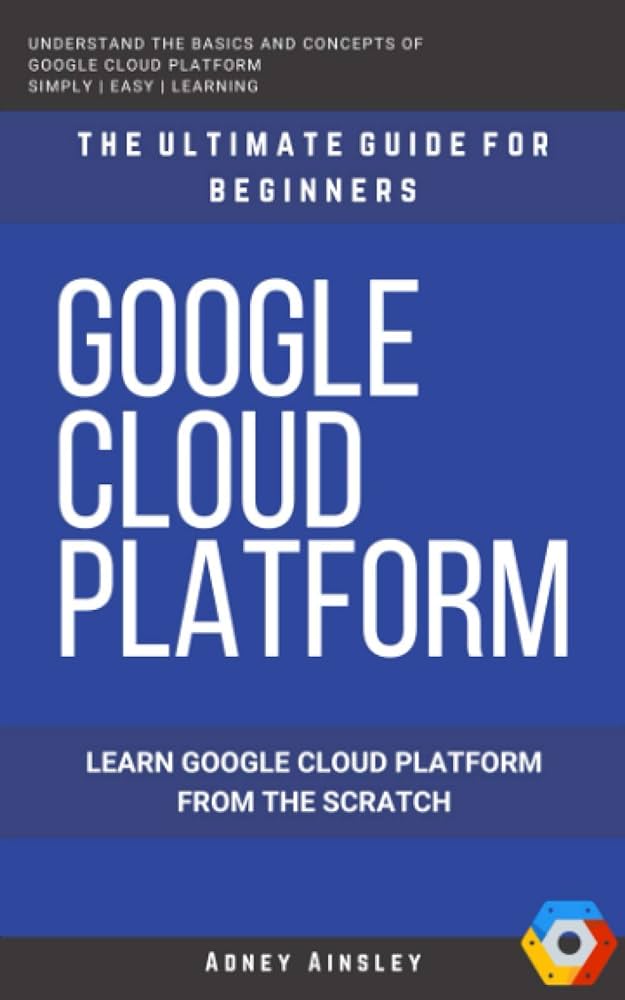
Storage and Database Solutions in GCP
GCP provides a variety of storage and database solutions to meet different needs and use cases. Here are some key storage and database services offered by GCP:
Cloud Storage Options
GCP offers various cloud storage options to store and retrieve different types of data. Cloud Storage provides object storage for unstructured data and offers features like durability, accessibility, and lifecycle management. Cloud Filestore provides managed file storage for applications that require a POSIX-compliant file system. Cloud Storage for Firebase is a scalable and secure file storage solution for mobile and web applications.
Cloud SQL
Cloud SQL is a fully managed relational database service provided by GCP. It supports popular database engines like MySQL, PostgreSQL, and SQL Server. Cloud SQL provides automatic backups, replication, and failover to ensure high availability and data durability. It also integrates with other GCP services like App Engine and Kubernetes Engine, making it easy to use in different application architectures.
Bigtable
Bigtable is a distributed NoSQL database service provided by GCP. It is designed for storing and processing large amounts of structured data with low latency. Bigtable offers high scalability and performance, making it suitable for applications that require real-time data processing, such as IoT, financial services, and ad serving. It provides features like automatic scaling, replication, and fine-grained access control.
Firestore
Firestore is a flexible and scalable NoSQL document database provided by GCP. It is designed to store, query, and sync data for web, mobile, and server applications. Firestore provides real-time data synchronization and offline support, making it suitable for applications that require data consistency across different devices. It also offers features like automatic scaling, transactions, and security rules for fine-grained access control.
Cloud Spanner
Cloud Spanner, mentioned earlier, is a globally distributed relational database service that offers ACID transactions, automatic scaling, and high availability. It provides the familiarity of a relational database with the scalability and flexibility of a NoSQL database. Cloud Spanner is suitable for mission-critical applications that require a globally consistent and highly available database. It supports SQL queries and provides horizontal scalability without data sharding or replication.
These storage and database solutions offered by GCP enable users to efficiently store, retrieve, and manage their data in the cloud.
Big Data and Analytics in GCP
GCP provides a suite of services for handling big data and performing advanced analytics. Here are some key services for big data and analytics offered by GCP:
BigQuery
BigQuery, mentioned earlier, is a fully-managed data warehouse and analytics platform. It allows users to analyze large datasets using SQL queries and provides high-speed data processing capabilities. BigQuery supports both batch and real-time analytics and can handle petabytes of data. It integrates with other GCP services and provides features like automatic scaling, data encryption, and data sharing.
Cloud Dataflow
Cloud Dataflow is a fully-managed service for batch and stream data processing. It allows users to develop and execute data processing pipelines using Apache Beam, a unified programming model for batch and stream processing. Cloud Dataflow provides automatic scaling, fault tolerance, and integration with other GCP services like BigQuery and Pub/Sub.
Cloud Dataproc
Cloud Dataproc is a managed Apache Hadoop and Spark service that allows users to process big data workloads. It provides a scalable and fully-managed environment for running Hadoop and Spark clusters without the need for infrastructure management. Cloud Dataproc integrates with other GCP services and provides features like auto-scaling, cluster customization, and integration with other big data tools.
Pub/Sub and Dataflow for Streaming Data
GCP offers Cloud Pub/Sub, a messaging service for streaming data, and Cloud Dataflow, a service for stream data processing. These services can be used together to build real-time streaming data pipelines. Cloud Pub/Sub provides reliable and scalable messaging capabilities, while Cloud Dataflow allows users to develop and execute stream data processing pipelines. This combination enables real-time analytics, anomaly detection, and event-driven architectures.
These big data and analytics services offered by GCP empower users to process and analyze large datasets, extract actionable insights, and build real-time data pipelines.
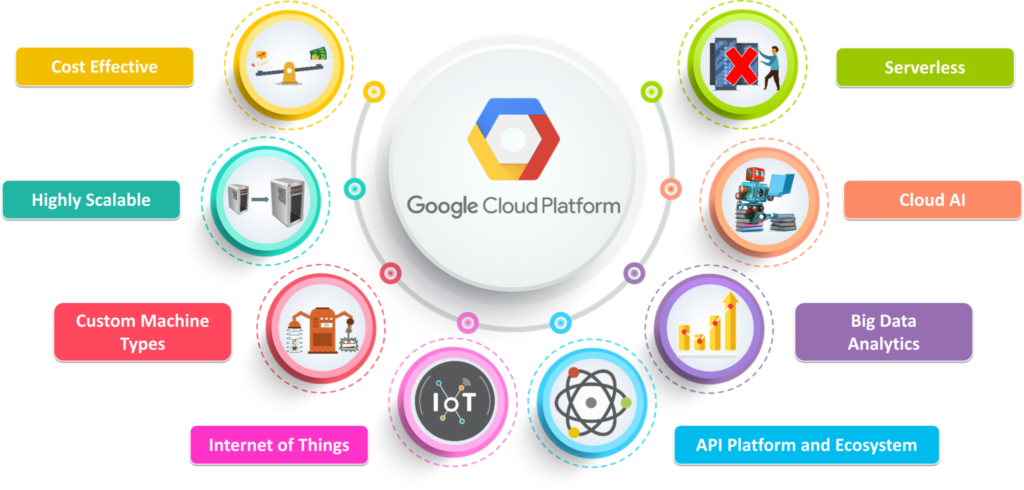
Machine Learning and Artificial Intelligence in GCP
GCP provides a robust and comprehensive set of services for machine learning and artificial intelligence (AI). These services enable users to build, train, and deploy machine learning models and leverage AI capabilities in their applications. Here are some key services for machine learning and AI offered by GCP:
BigQuery ML
BigQuery ML enables users to build and deploy machine learning models directly from BigQuery. It allows users to create and train models using SQL queries, making it easy for data analysts and SQL developers to leverage machine learning capabilities. BigQuery ML supports different types of models, such as linear regression, logistic regression, and time series forecasting.
Cloud AI Platform
Cloud AI Platform is a suite of services for building, deploying, and managing machine learning models. It provides a scalable and managed environment for training and serving models, making it easier for data scientists and developers to build and deploy AI applications. Cloud AI Platform supports popular machine learning frameworks like TensorFlow and provides features like distributed training, hyperparameter tuning, and model monitoring.
AutoML
AutoML is a set of services that allows users to build custom machine learning models without the need for extensive machine learning expertise. AutoML services automate the process of training, tuning, and deploying machine learning models, making it accessible to a wider audience. AutoML supports different use cases like image recognition, natural language processing, and structured data prediction.
TensorFlow on GCP
TensorFlow is an open-source machine learning framework developed by Google. GCP provides a robust infrastructure and services for running TensorFlow workloads at scale. GCP offers TensorFlow on Google Cloud AI Platform, which provides managed TensorFlow environments, distributed training, and integration with other GCP services. Users can take advantage of GCP’s scalability and flexibility to train and deploy TensorFlow models efficiently.
These machine learning and AI services offered by GCP enable users to build intelligent applications, automate tasks, and extract meaningful insights from their data.
Security and Identity Management in GCP
Security is a top priority for GCP, and it provides several services and features to ensure the protection and confidentiality of user data. Here are some key security and identity management services offered by GCP:
Identity and Access Management (IAM)
IAM is a service that allows users to manage access to GCP resources. It provides fine-grained access control, allowing users to define who can do what on their resources. IAM supports role-based access control (RBAC), allowing users to assign roles to users, groups, or service accounts. IAM integrates with other GCP services and provides features like access logs, audit logs, and service account keys management.
Cloud Identity-Aware Proxy
Cloud Identity-Aware Proxy (IAP) is a service that provides secure access to applications based on user identity and context. It allows users to control access to their applications by enforcing access policies and enforcing authentication and authorization requirements. Cloud IAP integrates with IAM, allowing users to define fine-grained access controls based on user roles or groups.
Cloud Key Management Service (KMS)
Cloud KMS is a managed service that allows users to manage cryptographic keys for their applications and services. It provides secure key storage, generation, and management, ensuring the confidentiality and integrity of user data. Cloud KMS integrates with other GCP services and allows users to manage keys via APIs or a web interface.
Data Loss Prevention
Data Loss Prevention (DLP) is a service that helps users discover, classify, and protect sensitive data. It provides pre-built detectors for sensitive data types like credit card numbers and social security numbers. DLP allows users to analyze their data and define policies to prevent data breaches or unauthorized access. DLP integrates with other GCP services and provides features like redaction, de-identification, and data discovery.
Cloud Security Scanner
Cloud Security Scanner is a web application vulnerability scanner provided by GCP. It allows users to scan their web applications for common security vulnerabilities, such as cross-site scripting and SQL injection. Cloud Security Scanner provides detailed reports and recommendations for mitigating vulnerabilities, allowing users to improve the security of their applications.
These security and identity management services offered by GCP ensure the protection and confidentiality of user data, helping users comply with security standards and regulations.
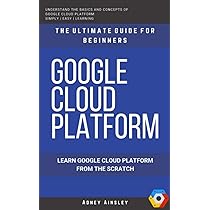
Deploying Applications on GCP
GCP provides various tools and services for deploying applications in a flexible and scalable manner. Here are some key services for deploying applications on GCP:
CI/CD with Cloud Build
Cloud Build is a continuous integration and continuous deployment (CI/CD) platform offered by GCP. It allows users to automate the building, testing, and deployment of their applications. Cloud Build integrates with popular code repositories and provides pre-built build environments for different programming languages. It also supports containerized builds, allowing users to build and push container images to registries like Container Registry.
Containerization with Kubernetes Engine
Kubernetes Engine, mentioned earlier, provides a scalable and robust platform for container orchestration. It allows users to deploy containerized applications in a distributed environment with ease. Kubernetes Engine supports popular container runtimes like Docker and provides features like automatic scaling, load balancing, and rolling updates. It integrates with other GCP services like Cloud Load Balancing and provides tools like Kubernetes Dashboard for managing and monitoring deployments.
Serverless Deployments with Cloud Functions
Cloud Functions is a serverless computing service provided by GCP. It allows users to write and deploy small snippets of code, known as functions, without the need to manage underlying infrastructure. Cloud Functions auto-scales functions based on demand and charges users only for the resources used during function execution. It integrates with other GCP services and event triggers, allowing users to build event-driven architectures and automated workflows.
Managing Multi-Region Deployments
GCP provides tools and services for managing multi-region deployments, ensuring high availability and redundancy. Users can deploy their applications in multiple regions, allowing them to provide low-latency access to users from different parts of the world and improve system resiliency. GCP provides load balancing and traffic management options, such as Global HTTP(S) Load Balancing and Cloud DNS, to distribute traffic across different regions and ensure seamless failover in the event of a regional outage.
These deployment services and tools offered by GCP enable users to automate their application deployment processes, scale their applications seamlessly, and ensure high availability and performance.
GCP Pricing
Understanding the pricing models and cost optimization strategies of GCP is crucial for managing cloud costs effectively. Here are some key aspects of GCP pricing:
Pricing Models
GCP provides flexible pricing models to accommodate different use cases and budgets. It offers pay-as-you-go pricing, where users pay only for the resources they consume on an hourly or per-second basis. GCP also provides various pricing plans for specific services or use cases, such as sustained use discounts, committed use discounts, and predefined machine types. It offers transparent and competitive pricing, allowing users to estimate their costs accurately.
Cost Optimization Strategies
GCP offers various cost optimization strategies to help users minimize their cloud expenses. It provides tools like Cost Explorer and Cloud Billing reports, which allow users to analyze their usage and spending patterns. GCP also provides recommendations for optimizing resource usage, such as rightsizing virtual machine instances, using preemptible instances, and leveraging committed use contracts. By following these cost optimization strategies, users can reduce their cloud costs significantly.
Pricing Calculator and Free Tier
GCP provides a pricing calculator that allows users to estimate their costs based on their resource usage. The pricing calculator takes into account factors like compute instances, storage usage, and data transfer. GCP also offers a free tier, which provides users with a limited amount of usage and credits, allowing them to explore GCP services and try them out at no cost for a specific period.
Understanding the pricing models, cost optimization strategies, and utilizing the pricing calculator and free tier can help users manage their cloud costs effectively and ensure cost-effectiveness.
In conclusion, GCP offers a comprehensive suite of cloud computing services that cater to various needs and use cases. Whether you are looking for scalable infrastructure, storage and database solutions, big data and analytics capabilities, machine learning and AI services, or secure and reliable networking, GCP has got you covered. With its flexible pricing, extensive documentation, and robust security and reliability features, GCP is a compelling choice for businesses and developers looking to harness the power of the cloud.